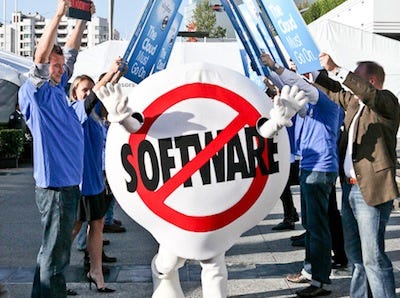The Real Reason Sales Role Play Fails—and How AI Role Play Fixes It
Yesterday, I hosted a live sales training call with a client’s sales team.
4 min read
![]() Dan Fisher
:
Apr 22, 2021 12:49:38 PM
Dan Fisher
:
Apr 22, 2021 12:49:38 PM

In 2000, Marc Benioff, then the CEO of a tiny startup that nobody had heard of paid professional actors to carry “anti-software” signs. They "picketed" in front of Siebel Systems annual user conference. At the time Siebel was the dominant provider of CRM software. And at that time, it was on-premise software. Remember on-premise software? That is software that actually runs on the customer's servers. Today, Salesforce.com is a $13B monster in the SaaS industry. Some would argue or hail Marc Benioff as a "celebrity CEO" and the story of Salesforce.com is taught in business schools all across America.
software? That is software that actually runs on the customer's servers. Today, Salesforce.com is a $13B monster in the SaaS industry. Some would argue or hail Marc Benioff as a "celebrity CEO" and the story of Salesforce.com is taught in business schools all across America.
Hubspot is a similar story. Hubspot began in 2006 with a blog and three customers. Nobody had even heard of Inbound Marketing. Their salespeople literally sold a concept that buyers had never even heard of. Today, they're close to $1B in revenue!
So how did salesforce and Hubspot so successfully disrupt the market of incumbent, on-premise software providers and marketing agencies with a model and concept no one had heard of before? How did they scale their revenue growth to quickly?
A key contributing factor to their hyper-growth and other hyper-growth companies like them is they focused on scaling their sales organization including how they make successful sales onboarding repeatable, scalable and predictable. These are engineers after all, who are leading these these hyper-growth companies and we can learn a lot from them!
Sales Process, Sales Methodology Enabler for Successful Sales Onboarding
Your sales process is a defined set of steps that the seller and the buyer must complete in sequential order to create and close a deal. Ideally, your sales process is aligned with the buyers journey.
Your sales methodology describes how you complete each step of your sales process and why. Your sales methodology tells your sellers “what to say,” “what to do,” and “what to show” prospective buyers across each stage of your sales process.
If you're wondering which you need, sales process or sales methodology, check out our blog, sales process vs. sales methodology.
A step in your sales process might call for "create sales call plan." Your methodology would provide all of the details regarding how to create a sales call plan, why you need to create a sales call plan and how to use your sales call plan.
Your overall sales methodology might be made up of multiple methodologies for each step in your sales process. For instance, at a basic level you need your salespeople to do the following six things:
You might adopt the Hubspot inbound marketing methodology for lead generation. For outbound prospecting you might adopt Menemsha Group's cold calling methodology. For discovery or qualifying opportunities, you might adopt the SPIN Selling questioning methodology and so forth.
The point is, it is the leader's job is to commit to adopting a methodology and coaching his or her people to adopting and executing that methodology across each stage of the sales process. This is how you makes sales onboarding successful, scalable and repeatable. This is how you get on the rocket ship to scaling your sales revenue growth. This is what Salesforce.com and Hubspot did and still do today.
By adopting a common sales methodology for how you execute each step in your sales process you set standards and expectations for how things are to be done. It's really about establishing what you do and how you do it. And for the record, adopting a sales methodology doesn't mean putting sales reps in a straight jacket.
Let's assume we commit to adopting SPIN Selling for how we ask probing questions during the Discovery stage of our sales process. Now, for every sales new hire we onboard, when it comes to teaching them the Discovery stage of our sales process, we teach them the SPIN Selling methodology. That is it. Boom.
No more asking our new hires to shadow umpteen different employees and then leaving it up to the new hire to decide which approach they prefer. That is what shadow training is! We know for a FACT THIS DOES NOT WORK.
When it comes to sales onboarding, the benefits to adopting a common sales methodology and sales process include:
The reality with most staffing firms and the real reason why most staffing firms struggle to successfully onboard new sales hires is they allow their sales reps to do their own thing. It's a management issue.
Here is what sales onboarding looks like for companies who fail to adopt a common sales process and sales methodology.
Day 1: New rep is introduced to the company CRM/ATS and taught some of the workflows within the system.
Day 2: New rep shadows tenured rep #1 and discovers this rep's preference for selling is cold calling. This rep is a cold calling machine. This rep uses the CRM but only for opportunities. He doesn't put leads into the CRM or document calls. That all remains in his head. He does however put "tickler reminders" in Outlook.
Day 3: New rep shadows tenured rep #2 and discovers this rep has built her business on networking. She is amazing at networking except now, in a Covid-19 world, there are no networking events to attend. This rep is really an account manager nurturing an existing, but eroding customer base. Because she is not focused on prospecting for new accounts there is nothing for the new hire to learn from an approach or methodology standpoint.
Day 4: New rep shadows tenured rep #3 and discovers this rep 'skill markets candidates' all day long. That is all this rep does. He makes calls and pitches the same 2-3 candidates. He logs his notes in the ATS on the candidate record, but does not follow the sales process and workflow set up in the CRM that the new hire was taught on day 1. He does however have workflows set up for how he prefers to nurture candidates. The new hire thinks, "interesting approach, a salesperson operating like a recruiter."
Day 5: New rep meets with manager and asks the manager "should I apply what I saw in shadowing tenured rep #1, #2 or #3?
Actually, that doesn't happen at all. The new rep takes in what they saw and learned from shadowing all of the reps and decides to adopt their own process based on what what they're most comfortable with, a hybrid of all three.
Three months later the new hire is struggling to get traction. Six months in, the new hire has come close but missed on closing his first deal. Nine months later he's gone.
See the pattern and problem here? Not only is this a haphazard onboarding experience, but it fails to scale.
Customers like CyberSearch new hires closed $1.2M in new business within 30 days from adopting a sales process and sales methodology. Applied Resource Group accelerated new hire ramp up by 25% by adopting a common sales process and methodology.
This is not a novel concept. I wish I could say it is, it's not. Anyone can be doing this. For additional information, check out our eBook, Making Successful Sales Onboarding Scalable, Repeatable and Predictable.

Yesterday, I hosted a live sales training call with a client’s sales team.

1 min read
Most staffing firms don’t struggle to scale because their teams aren’t working hard. They struggle because they don’t have a real go-to-market...

In my previous post, How to Prevent Unexpected Contract Terminations, I shared how systemizing consultant and client check-ins at key milestones...